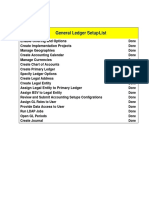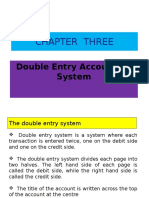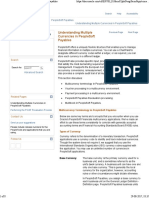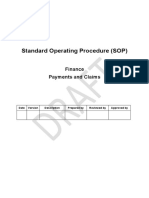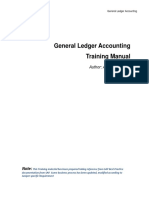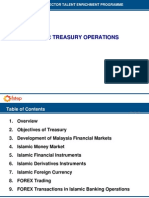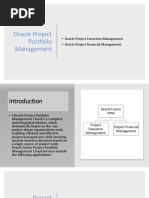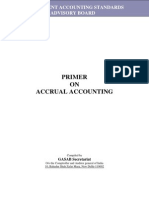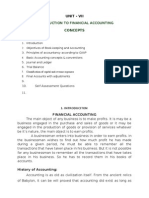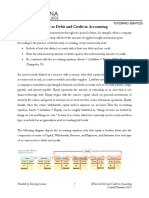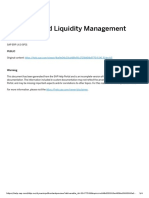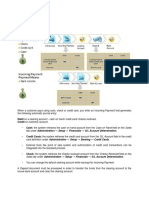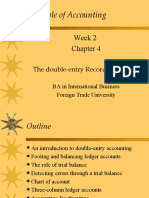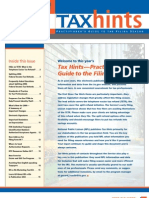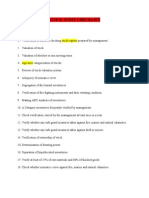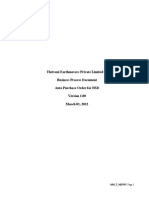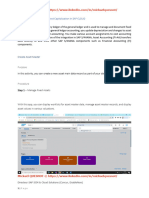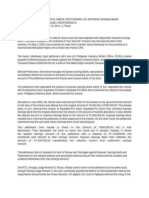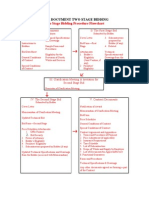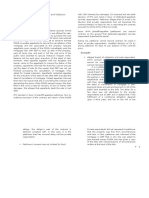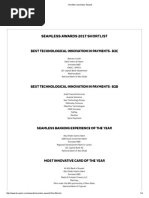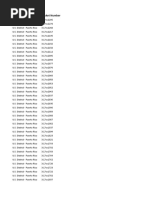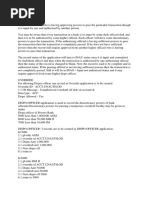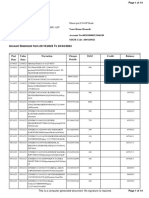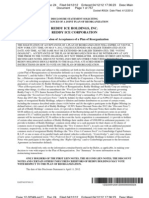Accounting Methods
Accounting Methods
Uploaded by
thiru_oracleCopyright:
Available Formats
Accounting Methods
Accounting Methods
Uploaded by
thiru_oracleCopyright
Available Formats
Share this document
Did you find this document useful?
Is this content inappropriate?
Copyright:
Available Formats
Accounting Methods
Accounting Methods
Uploaded by
thiru_oracleCopyright:
Available Formats
Cash Basis Accounting This is what "Based on Realization" We Most of us use the cash method to keep track of our
personal financial activities. The cash method recognizes revenue when payment is received, and recognizes expenses when cash is paid out. For example, our local grocery store's record is based on the cash method. Expenses are recorded when cash is paid out and revenue is recorded when cash or check deposits are received If we summarize, under the cash basis accounting, revenues and expenses are recognized as follows:
Revenue recognition: Revenue is recognized when cash is received. Expense recognition: Expense is recognized when cash is paid.
Take a note the word "cash" is not meant literally - it also covers payments by check, credit card, barter, etc. Moreover it is not standard method in compliance with accountings matching principle. Accrual Basis Accounting This is what "Based on Recognition" The accrual method of accounting requires that revenue be recognized and assigned to the accounting period in which it is earned. Similarly, expenses must be recognized and assigned to the accounting period in which they are incurred. Then the underline question is what is accounting Period, Let explain like this normally a company tracks the summary of the accounting activity in time intervals, which we normally called as Accounting periods. These periods are usually a month long. It is also common for a company to create an annual statement of records. This annual period is also called a Fiscal or an Accounting Year. In the accrual method relies on the principle of matching revenues and expenses. This principle says that the expenses for a period, which are the costs of doing business to earn income, should be compared to the revenues for the period, which are the income earned as the result of those expenses. In
other words, the expenses for the period should accurately match up with the costs of producing revenue for the period
Take a case: Company is doing a business and they have to pay sales commissions expense, so sales commissions expense should be reported in the period when the sales were made (and not reported in the period when the commissions were paid). Similarly, Salary/Wage to employees are reported as an expense in the week/month when the employees worked and not in the week/month when the employees are paid. If a company agrees to give its employees 2-month equivalent salary of its 2006 revenues as a bonus on January 25, 2007, the company should report the bonus as an expense in 2006 and the amount unpaid at December 31, 2006 as a liability. This is most simple kind of matching principal normally has.
In general, there are two types of adjustments that need to be made at the end of the accounting period. 1. The first type of adjustment arises when more expense has been recorded than was actually incurred or earned during the accounting period. 2. Similarly, there may be revenue that was received but not actually earned during the accounting period. Also known as Un-earned Revenue. The accrual method generates tax obligations before the cash has been collected (because revenue leads to tax and revenue is recognized against receivable and not against receipt of money). If we summarize, under the accrual basis accounting, revenues and expenses are recognized as follows
Revenue recognition: Revenue is recognized when both of the following conditions are met: o Revenue is earned i.e. when products are delivered or services are provided.
Revenue is realized or realizable. i.e. either cash is received or it is reasonable to expect that cash will be received in the future. Expense recognition: Expense is recognized in the period in which related revenue is recognized (Matching Principle).
o
Timing differences in recognizing revenues and expenses Various accounting books did mention four potential timing differences in recognizing revenues and expenses between these of two. Just to recap of those: a. Accrued Revenue: Revenue is recognized before cash is received. b. Accrued Expense: Expense is recognized before cash is paid. c. Deferred Revenue: Revenue is recognized after cash is received. d. Deferred Expense: Expense is recognized after cash is paid.
Compare with a Case to explain these two methods Your company purchase a new Laptop on credit in May 2007 and pay $1,500 for it in July 2007, two months later. Under the both case see how this makes a difference: Using the cash method accounting, you would record a $1,500 payment for the month of July, the month when the money is actually paid. Under the accrual method, you would record the $1,500 payment in May, when you take the Laptop and become obligated to pay for it. Pros and cons of these Two accounting method Maintence: The cash method is easier to maintain because you don't record income until you receive the cash, and you don't record an expense until the cash is paid, where as in the accrual method, you will typically record more transactions. Cash-basis accounting defers all credit transactions to a later date. It is more conservative for the seller in that it does not record revenue until cash receipt. In a growing company, this results in a lower income compared to accrual-basis accounting.
Cash-based accounting means that sales are recorded when you receive the money, and expenses are recorded when they are actually paid. What benefit does cash based accounting provide? There are actually only a couple of benefits from using the cash based method accounting,
however if this method fits your business, it will save you money in bookkeeping expenses. If most of your sales are cash sales, you don't maintain an inventory, and you don't have customer accounts or returns, then the cash based method is a much better choice, because it's much easier and it's much cheaper to maintain. The greatest advantage to cash based accounting, allows an information manager, or if you're a small business, the business owner to quickly assess if the business is operating profitably, but only if the business is for the most part a cash business; with little or no inventory and cash sales. You can better assess profit levels when you use the accrual based method because you match income to expenses more accurate
You might also like
- Oracle Accounting - Accounting BasicsDocument28 pagesOracle Accounting - Accounting Basicskarthikppillai100% (3)
- Funderburk Accounting Accruals and Deferrals For AttendeesDocument50 pagesFunderburk Accounting Accruals and Deferrals For AttendeesMechileNo ratings yet
- Bill of Exchange ProcessDocument1 pageBill of Exchange Processvenky3105No ratings yet
- Oracle Fusion General Ledger SetupsDocument18 pagesOracle Fusion General Ledger SetupsDeepak MuraliNo ratings yet
- Topic 03 - Double Entry SystemDocument37 pagesTopic 03 - Double Entry SystemNorainah Abdul GaniNo ratings yet
- Multi Currency in PeoplesoftDocument8 pagesMulti Currency in PeoplesoftdannydongappaNo ratings yet
- Rural Banking ProjectDocument55 pagesRural Banking ProjectDelisa Misquitta0% (1)
- SOP Payments and Claims ULDocument5 pagesSOP Payments and Claims ULfaizaldalimiNo ratings yet
- Automatic OFFSETS and Pooled Acc White PaperDocument6 pagesAutomatic OFFSETS and Pooled Acc White PaperHimanshu MadanNo ratings yet
- Bank Accounts OUs Ledgers Legal Entities RelationshipDocument7 pagesBank Accounts OUs Ledgers Legal Entities RelationshipSri RishiNo ratings yet
- Accounting White Paper PDFDocument19 pagesAccounting White Paper PDFIndumathi KumarNo ratings yet
- CH 2 Recording ProcessDocument7 pagesCH 2 Recording ProcessFarhanAnsari100% (1)
- How To Setup A Remit-To Address in Release 12 Oracle ReceivablesDocument5 pagesHow To Setup A Remit-To Address in Release 12 Oracle ReceivablesnghazalyNo ratings yet
- IBM - E20-8058 Basic Accounting Concepts 1961Document50 pagesIBM - E20-8058 Basic Accounting Concepts 1961shivanadhunichaitany100% (2)
- Autolock Box Concepts in r12Document21 pagesAutolock Box Concepts in r12devender_bharatha3284No ratings yet
- Chargebacks in Oracle ReceivablesDocument8 pagesChargebacks in Oracle ReceivablesAd ElouNo ratings yet
- General Ledger Accounting Training Manual: Author: Ask SAP ExpertDocument78 pagesGeneral Ledger Accounting Training Manual: Author: Ask SAP Expertsaif RashidNo ratings yet
- Gen Ledger AccountsDocument15 pagesGen Ledger AccountsMoises CalastravoNo ratings yet
- Withdraw at An ATMDocument23 pagesWithdraw at An ATMAnonymous y3E7iaNo ratings yet
- Introduction To Debits and CreditsDocument8 pagesIntroduction To Debits and CreditsMJ Dulin100% (1)
- FSTEP Islamic - Treasury - OperationDocument89 pagesFSTEP Islamic - Treasury - Operationalhoreya100% (1)
- Marjon A. Limot October 7, 2020 Bsba-3B TTH (5:30Pm-7:00Pm) Fm130:Monetary Policy and Banking Prof: Maam Erlinda J. Diasemen Assignment No.2Document2 pagesMarjon A. Limot October 7, 2020 Bsba-3B TTH (5:30Pm-7:00Pm) Fm130:Monetary Policy and Banking Prof: Maam Erlinda J. Diasemen Assignment No.2MarjonNo ratings yet
- DUMP For EXAMDocument34 pagesDUMP For EXAMShwetaSinghNo ratings yet
- Oracle Project Execution Management. - Oracle Project Financial ManagementDocument15 pagesOracle Project Execution Management. - Oracle Project Financial ManagementhiitarunNo ratings yet
- Primer ON Accrual Accounting: Government Accounting Standards Advisory BoardDocument15 pagesPrimer ON Accrual Accounting: Government Accounting Standards Advisory BoardSanday NdiemaNo ratings yet
- Summary of Important Us Gaap:: Under US GAAP, The Financial Statements Include TheDocument28 pagesSummary of Important Us Gaap:: Under US GAAP, The Financial Statements Include TheSangram PandaNo ratings yet
- Oracle Incentive Compensation Demo: Presenter: Abhijit ChakrabortyDocument20 pagesOracle Incentive Compensation Demo: Presenter: Abhijit Chakrabortyகண்ணன் ராமன்No ratings yet
- Accruals & PrepaidDocument20 pagesAccruals & Prepaidmeliana sariNo ratings yet
- US Internal Revenue Service: p4579Document208 pagesUS Internal Revenue Service: p4579IRSNo ratings yet
- Accounting Setup in Oracle General LedgerDocument3 pagesAccounting Setup in Oracle General LedgerAshwinNo ratings yet
- Unit-I: SVD & SGL College of Management and Technology: RajahmundryDocument38 pagesUnit-I: SVD & SGL College of Management and Technology: RajahmundryHappyPrinceNo ratings yet
- Account PayablesDocument7 pagesAccount PayablesswamymerguNo ratings yet
- Concepts: Introduction To Financial AccountingDocument30 pagesConcepts: Introduction To Financial Accountingbmurali37No ratings yet
- Fico PDFDocument148 pagesFico PDFAniruddha ChakrabortyNo ratings yet
- 4-Accrual Accounting ConceptsDocument115 pages4-Accrual Accounting Conceptstibip12345100% (5)
- When To Debit and Credit in AccountingDocument8 pagesWhen To Debit and Credit in Accountinguser31415No ratings yet
- What Is A Lockbox?Document7 pagesWhat Is A Lockbox?sureshyadamNo ratings yet
- Turbo Charge Your Accounting With The Release 12 Subledger Accounting EngineDocument9 pagesTurbo Charge Your Accounting With The Release 12 Subledger Accounting EngineHussein Abdou HassanNo ratings yet
- Bill of Exchange PresentationDocument4 pagesBill of Exchange PresentationZORRONo ratings yet
- Banking ProcessDocument17 pagesBanking Processpijej25153No ratings yet
- Accounts ReceivableDocument3 pagesAccounts Receivablesubrat100% (1)
- Government Accounting (AFA-II) : Governmental Entities: Introduction and General Fund AccountingDocument8 pagesGovernment Accounting (AFA-II) : Governmental Entities: Introduction and General Fund AccountingMd. Rejaul Ahsan Chowdhury100% (1)
- 2.double-Entry Recording Process - CLCDocument48 pages2.double-Entry Recording Process - CLCTrang Nguyen100% (1)
- Debits and Credits: (Cheat Sheet)Document9 pagesDebits and Credits: (Cheat Sheet)Sasha Jaffe100% (1)
- 1z0-506 Questions and Answers HTTP WWW - Testsnow.net TXT 1 1288 14182.HTMLDocument102 pages1z0-506 Questions and Answers HTTP WWW - Testsnow.net TXT 1 1288 14182.HTMLmurali0% (1)
- US Internal Revenue Service: p4437Document31 pagesUS Internal Revenue Service: p4437IRS100% (1)
- Stock AuditDocument4 pagesStock Auditraana987No ratings yet
- Treasury Management FunctionDocument26 pagesTreasury Management FunctionKiran MehfoozNo ratings yet
- Financial Institutions in The Financial SystemDocument15 pagesFinancial Institutions in The Financial SystemNigussie Berhanu100% (1)
- Accrual Accounting ProcessDocument52 pagesAccrual Accounting Processaamritaa100% (1)
- Financial Leverage Ratios, Sometimes Called Equity or Debt Ratios, MeasureDocument11 pagesFinancial Leverage Ratios, Sometimes Called Equity or Debt Ratios, MeasureBonDocEldRicNo ratings yet
- Assignment in Specialized AccountingDocument18 pagesAssignment in Specialized Accounting143incomeNo ratings yet
- Auto Purchase Order For HSDDocument10 pagesAuto Purchase Order For HSDAneesh ShamsudeenNo ratings yet
- The New Foreign Asset Tax Reporting Rules Impact M&A TransactionsDocument5 pagesThe New Foreign Asset Tax Reporting Rules Impact M&A TransactionsRoger Royse100% (1)
- DTC ProvisionsDocument3 pagesDTC ProvisionsrajdeeppawarNo ratings yet
- Asset Acquisition Through Direct Capitalization in SAP CLOUDDocument72 pagesAsset Acquisition Through Direct Capitalization in SAP CLOUDRaju Raj RajNo ratings yet
- FIRS Handbook on Reforms in the Tax System 2004-2011From EverandFIRS Handbook on Reforms in the Tax System 2004-2011No ratings yet
- The Tax Law of Charitable Giving: 2019 Cumulative SupplementFrom EverandThe Tax Law of Charitable Giving: 2019 Cumulative SupplementNo ratings yet
- Challan Form CSS PDFDocument2 pagesChallan Form CSS PDFMuhammd Shahroz YousafNo ratings yet
- ICRA Research MFIDocument8 pagesICRA Research MFIJaiganesh M SNo ratings yet
- Rbs Final ReportDocument42 pagesRbs Final ReportAli HafeezNo ratings yet
- Maurice Ferre Park Conservancy AgreementDocument22 pagesMaurice Ferre Park Conservancy Agreemental_crespoNo ratings yet
- GR 176697Document3 pagesGR 176697Carla Eclarin BojosNo ratings yet
- Bank Guarantee - Swift Verbiage - Approved MasterDocument3 pagesBank Guarantee - Swift Verbiage - Approved Masterjoe andaresta100% (1)
- Australian School of BusinessDocument12 pagesAustralian School of BusinessMaria Luisa Laniado IllingworthNo ratings yet
- Alur Document Two Stage BiddingDocument2 pagesAlur Document Two Stage BiddingHenryNo ratings yet
- Merchandising QuizzerDocument1 pageMerchandising QuizzerjadeNo ratings yet
- RBL Mitc FinalDocument40 pagesRBL Mitc Finalsamarth guptaNo ratings yet
- IC 72 Motor Insurance PDFDocument597 pagesIC 72 Motor Insurance PDFSaba Ansari77% (13)
- Vice President Finance in San Francisco Bay CA Resume Linda WrightDocument3 pagesVice President Finance in San Francisco Bay CA Resume Linda WrightLindaWright1No ratings yet
- Oblicon - CD Case #59 - Tan Vs CA and Sps SingsonDocument2 pagesOblicon - CD Case #59 - Tan Vs CA and Sps SingsonCaitlin Kintanar100% (1)
- Bhavani PPT On SynopsisDocument12 pagesBhavani PPT On SynopsisAnkitha KavyaNo ratings yet
- Cimb Bank Berhad (13491-P) DeclarationsDocument8 pagesCimb Bank Berhad (13491-P) Declarationsfaeez zainNo ratings yet
- Syahriah 12 PutraDocument3 pagesSyahriah 12 PutraAkhmad TajuddinNo ratings yet
- Shortlist - Seamless AwardsDocument4 pagesShortlist - Seamless AwardsAfra FathimaNo ratings yet
- Itinerary ConfirmationDocument4 pagesItinerary ConfirmationJhun Dela CruzNo ratings yet
- DPT3 MailDocument3 pagesDPT3 MailSangaviNo ratings yet
- Roosevelt Cayman Federal CasesDocument81 pagesRoosevelt Cayman Federal CasesMolly GottNo ratings yet
- Like A GirlDocument1 pageLike A Girlapi-326793280No ratings yet
- Accountancy Collection PDFDocument13 pagesAccountancy Collection PDFArindam MukherjeeNo ratings yet
- Dish TV RechargeDocument6 pagesDish TV RechargenoblemanimalaNo ratings yet
- Dispo OfficerDocument2 pagesDispo OfficerGodwin OfoeNo ratings yet
- Chapter - 4 Intermediate Term FinancingDocument9 pagesChapter - 4 Intermediate Term FinancingmuzgunniNo ratings yet
- MunicipalBank E-Passbook23-04-2024 121305Document14 pagesMunicipalBank E-Passbook23-04-2024 121305RudhviNo ratings yet
- Extra Material Units 1 and 2Document4 pagesExtra Material Units 1 and 2YanetNo ratings yet
- Reddy Ice Disclosure StatementDocument757 pagesReddy Ice Disclosure Statementbankrupt0No ratings yet



